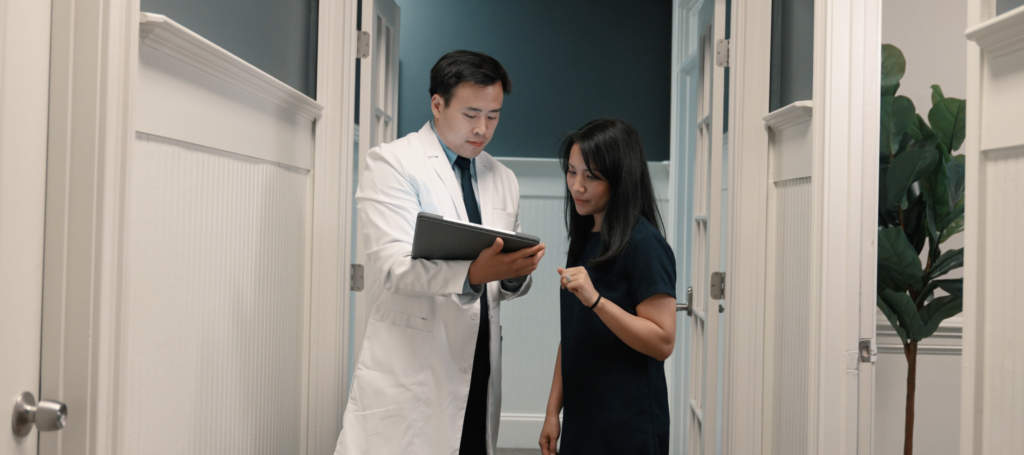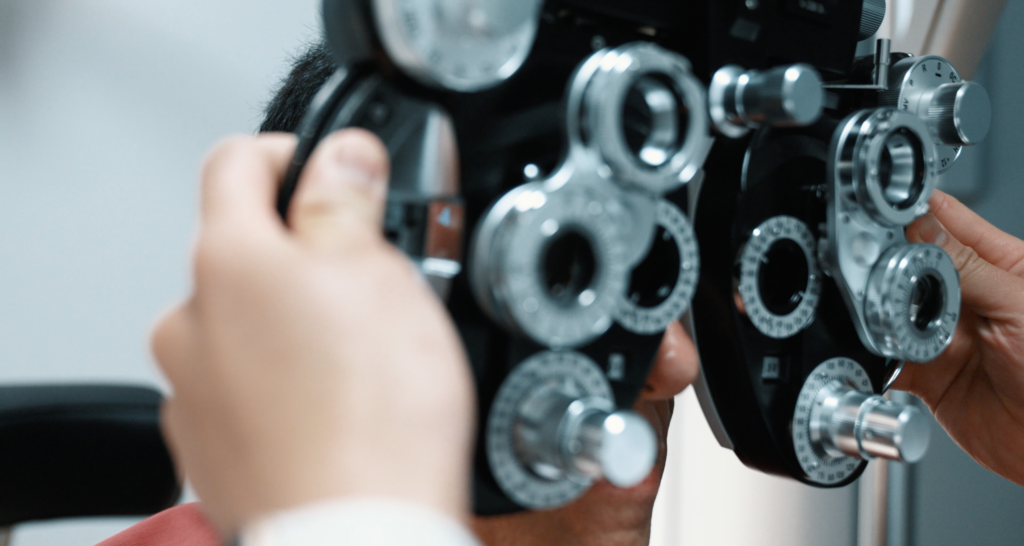Table of Contents
Don’t Be A Statistic: Find the Right Job
50% of ophthalmologist will leave their first job within 2 years.
That is a crazy stat. In fact, there are some sources that put it closer to 80%.
There are many reasons why someone may leave their job, but a good bit of it is about finding a job that lines up with your career goal.
In residency, they do an excellent job of teaching you how to take excellent care of eyes and how to perform cataract surgery. But medical school and residencies do NOT teach you real life stuff. Like – what can you expect once you are out of residency?
Well today, I want to bridge that gap by talking about something very basic. What type of jobs are out there?
As you may know, I recently started my own ophthalmology practice, and I love every bit of it. But my reasons for loving going solo may be a huge turn off for others. And that’s okay.
What makes medicine and life in general in amazing is that you can have your own opinion. I think what makes medicine amazing is that you can find your own niche. I mean think about it. In your medical school class, you had friends going into every specialty. There were radiologists, pediatricians, dermatologists, and ophthalmologists. But in truth, you may be happy as an ophthalmologist, but you may NOT be happy as a pediatrician. There is not one right speciality and again, there is no one right type of job.
This is why I firmly believe you need to figure out what type of jobs are out there before deciding to join one. I do think there is almost a spectrum. On one side, you have less autonomy and more structure, and on the other wise you have more autonomy and less structure. This post is clearly generalizing a lot, but I still hope it helps you view finding job in a new perspective.
Academics: A Way to Teach & See Pathology
First, we have academics. If you are in residency, you are probably most familiar with it.
There are many pros of an academic job.
- The first is familiarity. You know the hierarchy. You have interns, residents, fellows, professors, department heads, chairs. There’s no questioning who is on top of the food chain.
- Also, at a large academic center, your schedule/lifestyle is very sturctured: There is an ophthalmologist (usually the resident or fellow) on call 24-7 to cover emergency patients as well as any of your personal patients when you are off or in the operating room.
- There are also more challenging cases. Many academic centers are your referral centers, so you get some pretty advanced pathology. For many, that can be both a pro and a con.
- For those passionate about teaching and research, academics is a great fit. An academic institution has all of the systems in place to get you started in research right away. However, there may be limitations in the type of research you can do.
- Mentorship and Partnership: When you have a large diverse group, you have opportunities for mentorship. In addition, if you have a difficult or challenging case, you have quickly get a second opinion. Sometimes, it as simple as running down the hall for a second opinion.
- The benefits are typically solid at an academic job. With any academic job, there is usually very good paid leave, education leave for conference, maternity and paternity leave, sick leave, and jury leave. You also have very good health insurance and retirement.
- As huge plus, you don’t have to worry about HR -, the hiring and firing of employees. However, not having that control over your team and employees could adversely affect your clinic flow and team dynamics.
Now for the cons of academics. What actually are many of the pros, can easily be placed in the cons list as well. Let’s touch on a few,
- With more structure, there is more red tape. The number of administrators per doctor are typically high in academics. Often, university wide decisions have impacts on individual departments. For example, I know of a university that had an adapted to an RVU system. The part that was insane was that an associate professor or full professor were paid differently even if the same procedure was performed. This wasn’t decided on a department level, but on a university wide decision.
- And with research – if you don’t like research, academics may not be a good fit for you.
- Finally, the earning potential may be lower in academics than in private practice.
Kaiser and the VA: Stability but Slow to Adapt
Pros: In many regards, it is very similar to an academic job.
- You often have a very similar regular schedule and structure, mentorship and partnership opportunity.
- The benefits are stellar and if not better than in an academic setting. I always found that White Coat Investor to share valuable information talking about topics like pension, so I linked the article here.
- One of the main differences between Kaiser and academics is the research component. In academics, there is an emphasis on research, and at a job like Kaiser, it may not be as a big component.
- Your starting salary is usually high.
- And unique to the VA, you are protected from malpractice lawsuits.
Cons: Sometimes Slow
- Lack of autonomy – again, with structure comes red tape. Typically, you have a set volume that you have to meet, medications and surgical indications are very tightly define. For example, I had a friend who joined a Kaiser group out on the East coast. He was a glaucoma trained surgeon comfortable with all MIGS. When he joined Kaiser, he asked them to do MIGS, and it took over a year to get approval for something as simple as an iStent device. In contrast, at the ASC I operate at, we have access to the latest devices almost within the first month that the product is released to the mass market.
- Income potential: There is classically a cap on reimbursement or a ceiling. Your earning potential will never be quite as high as private practice
Private Practice: Potentially an Ideal Spot
As we transition down this list, we continue to have more autonomy, more HR, and potentially more earning potential. However, there is less structure and regularity. I feel like with private practice, there are so many variations. You have small private practices (2-4 doctors) or larger practices (10-20 or even more). The ownership also varies as well. You have corporate owned practices and you have physician owned practices. I will exclude solo practices from the pros and cons list here.
Pros:
- There is typically more autonomy. As a potential owner in private practice, there are typically less administrators to deal with.
- The income potential is usually pretty favorable. If you join a busy practice, you can start off with a high volume practice. But usually, you have to build your practice up.
- And also important, you have the potential to gain equity which is valuable. That means you can have a partial ownership to the business side of the medical practice which may include real estate, optical sales, and the ASC.
Cons:
- The pipeline is key. You need to figure out when a brand new patient calls in for a cataract surgery consultation, are these patients allocated evenly? Also, if your practice has optometrists, do they refer patients evenly or is there a very specific referral pattern. Even if the average surgeon at said private practice has a high volume, there may be a disparity. The average may be 20 cases a week, but if one partner is doing 35 a week, and the associate is doing only 5, the average caseload is still 20. In addition, I do know of a specific MD-OD practices where some ODs are required (in a written agreement) to refer to a specific surgeon in the practice. In fact, the pipeline is such a huge topic, that I will do a separate post going over situations where the pipeline is not evenly spread to every surgeon.
- No guaranteed that you will be able to buy. The “Burn and churn scenario.” There is a notorious practice I am familiar with where there is 1 main partner. He brings on an associate every 3-4 years with promises to make partner. However, when it is time for partnership evaluation, the buy-in is so high that the associate leaves. The partner then finds a new associate to fill his clinic spots and collects over the associate surgeon.
- Hard to truly get sense if it’s a good culture. . Talk to your local doctors and also talk to your local reps. They have the inside scoop on a good or bad practice. Sometimes, other local optometrist or PCPs may not want to refer to your large private practice for whatever reason. That means you as a new associate largely depend on that pipeline we previously discussed about. If you do not have a large external referral source, you will find it hard to get busy quickly
- The Benefits are also not as strong as in academics or private practice. Not all private practices will give you maternity or paternity leave, and that’s something to really look at.
- In addition, the opportunities for mentorship and support may be less than at Kaiser or academics. If you practice is smaller, you just have less doctors to quickly discuss a case with.
And remember, even within private practice, the dynamics can quickly change. You can be brought into a practice with promise of being a partner with equity ownership. You are left to trust the word of your colleagues, and overnight, you can quickly find out that the practice is selling to a PE group or hospital. Although you may have found out overnight, this deal had been brewing for months.
I won’t dive into the private equity discussion in this post but you can quickly find very strong opinions quickly by doing a quick google search and finding various forums or just by going to ASCRS or AAO. I will say that I personally haven’t met any particular doctor who works as an associate and is thrilled about their current opportunity. Many do feel stuck or just content. There has been a few particles pushed on Doximity highlighting the merits of PE owned practice, but many of those quoted were part of the group of doctors who benefit directly from the transaction.
Solo: A Great Opportunity for Many
Obviously, if you are reading this post on this blog, you know that I opened up solo. I am obviously biased in thinking in that solo is the best job type. However, it may surprise you that I actually think a small practice with 2-3 partners is the idea practice to join. Ultimately, it comes down to having opportunity to own the practice and build equity. You should check out the cataractcoach.com’s podcast on his journey going solo. I was on it, and we agreed on many ideas. Obviously, I realize our bias, but definitely think about solo.
Pros: You are the Boss
- The biggest pro of all in a solo practice is the autonomy. You make the decisions. You control the hiring and firing. You control what equipment to use. You control all facets of your practice.
- High income ceiling. You eat what you kill. You might actually make more in the long run. Remember, the name of the game is overhead. We talked about it a lot more in the previous post, so check out that video for a more in depth discussion. In fact, this blog post is what inspired me to go solo. I actually find the numbers to be pretty spot on.
- Tax Benefits: The amount of tax benefits reserved for business owners is innumerable. In addition to making more money, you also have the ability to grow this money in many different ways. This section alone is worthy for another post, so stay tuned.
Cons: It Comes Down To You
- What makes a solo start up unique you have autonomy and rely on yourself. That also means all the burdens of running a practice falls on you an your team. There is a very high start up cost. The numbers I have heard from talking to fellow solo doctors is about 150K to 350K. And you are footing this bill yourself. Again, since you are relying on yourself, I cannot stress how anxious this process can be.
- Your practice is brand new, and you cannot expect to have a busy clinic within the first few months. Your bills don’t stop simply because you aren’t busy. You have to pay back your loan, your rent, and your payroll.
- In addition, there is a lot less support. The mentorship and partnership that made academics or Kaiser shine is simply much harder to find. Sure there is a robust community of solo ophthalmologist online, but nothing beats face to face contact. It is actually why I went with a consultant personally when I opened up my office. Do you need a consultant to open up an office? Absolutely not. Do I love the fact that I have a support team, absolutely.
That was a quick overview of the most common types of jobs out there for fellow doctors. I want to leave you with a few parting words.
- There is NO one single right job.
- I have met individuals who are happy in all types of job settings, and I think that’s what makes the medical field so beautiful. We have options.
- The most important thing though is to really know what YOU want. Only then can you make the right choice
Anyways, please comment below your thoughts.
I am more than happy to expand this discussion in the future, and I plan on doing so as I gain more experience and chat with more of my colleagues at national meetings.
My only goal is to help my fellow colleagues out there.



